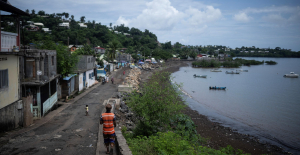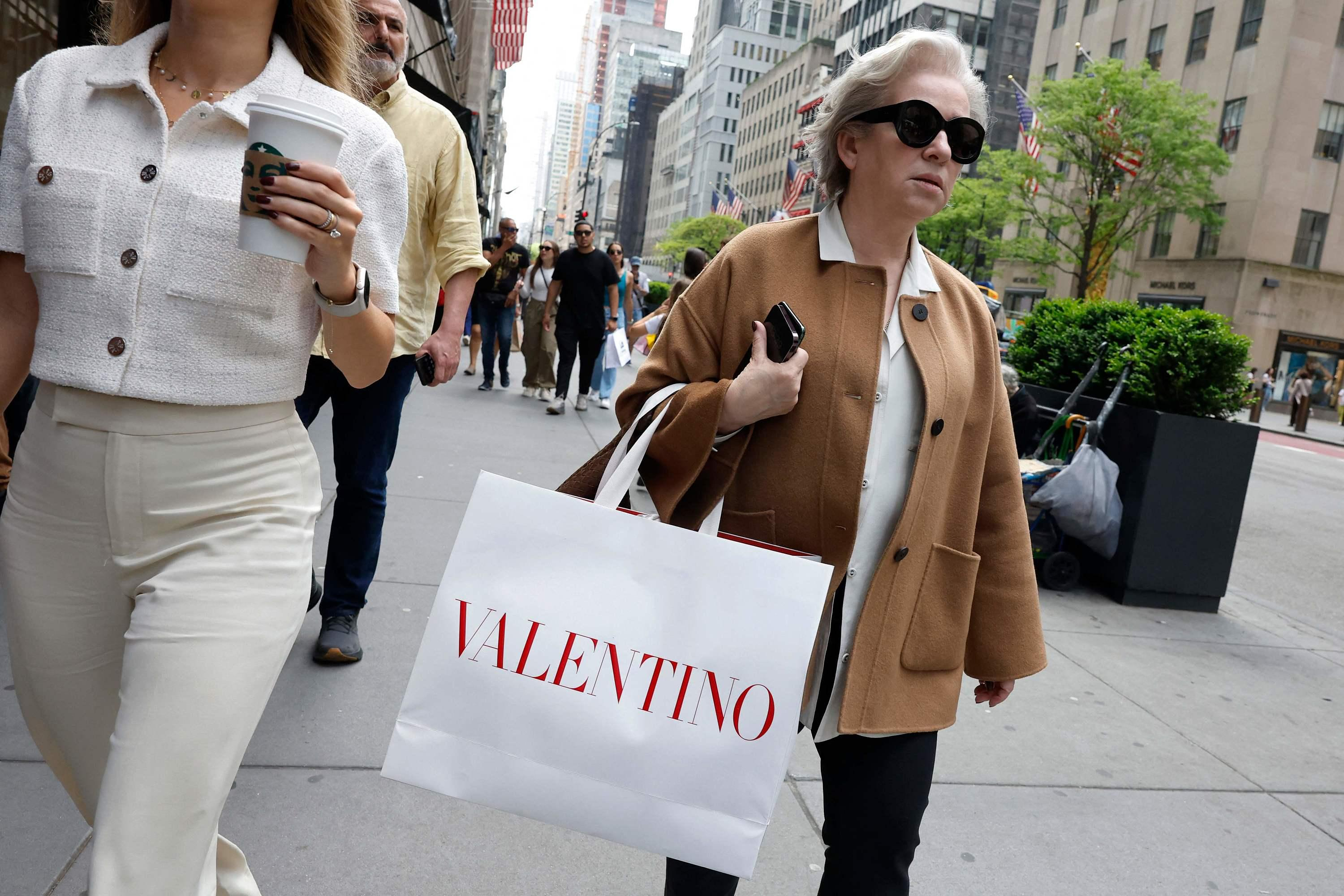With attendance increasing by around 20% in 10 years, the five RER lines in the Ile-de-France region must adapt to ever-increasing demand, while their capacity is plateauing. This is the whole problem raised by the report presented this Wednesday by Pierre Moscovici. The first president of the Court of Auditors thus estimated that the “performance” of the RER operators in Île-de-France – the RATP and the SNCF – was “not satisfactory”. He therefore called for reviewing the terms of the contracts between the two operators and for continuing or even accelerating investment efforts. All while calling on Île-de-France Mobilités to be more demanding on the quality of services provided by operators.
“It’s a very French paradox, we have a rate of public spending which is reaching peaks, while at the same time, the French are less and less satisfied with the public service,” said the former Minister of Defense. 'Economy. Before specifying that the Court of Auditors chose to “conduct an audit based on the quality of this public service” in Île-de-France. And this, “taking into account” as a priority “the point of view of travelers” over a period going “from 2016 to 2022”. And if he is not particularly dismayed by the RER offer in the region - remembering that it is still one of the busiest networks in the world behind the Tokyo Yamanote line and the suburban network of Bombay - the observation is not glorious however.
Among the first criticisms, the Court of Auditors points out “the modest satisfaction rates” as well as “the mediocre punctuality rates” in the face of the “foreseeable increase in attendance”. The two lines B and D, the most tested, respectively display punctuality rates of barely 85.7% and 86.6%. According to Pierre Moscovici, RER ridership “increased by 5% on the RATP network and 12% on the SNCF”, even though the number of trains has not changed and “incidents of all kinds are deteriorating the service ". “In fact, apart from line A, the punctuality of the lines remains below the objectives”, underlines the institution of rue Cambon, while urging Île-de-France Mobilités (IDFM), the transport organizing authority in common, to demand to receive “operational and ticketing data in real time”.
Another weak point of the network: the co-management of operations by both RATP and SNCF. “The common organization for the operation of the most fragile lines is much more laborious, at the crossroads of two regulations, cultures and two know-how”, we can read in the report, when the magistrates call for “an effort coordination between the different actors. They recommend launching the implementation of a “new organization adapted to a line logic without waiting for the opening to competition in 2040”. And to illustrate these difficulties, the first president takes the example of line B whose management is “too complex, even illegible” or the establishment of a single command center between the two operators, under study for many years, but whose implementation is not planned before 2031. “These are delays which are no longer acceptable,” launched Pierre Moscovici.
In addition, he considers that the RERs “suffer from a certain underinvestment (...) characterized by delays in the renewal of trains and an insufficient maintenance effort of the infrastructures”. He therefore considers it “indispensable” to invest as quickly as possible, citing as an example the change of “certain century-old catenaries”. Investments “which can no longer be postponed,” he assures. And as an avenue for improvement, the report recommends “publishing an annual report on the quality of service in the RERs”, “defining and implementing an operator audit strategy”, still too little used by IDFM according to Pierre Moscovici, to “establish a contract between IDFM and SNCF Réseau to implement specific performance indicators” or even to “provide for a financial accountability mechanism directly applicable to SNCF Gares
Also read: Incidents, delays, obsolete equipment... Valérie Pécresse's 14 jobs to save the RER B
Far from avoiding the central question of financing public transport, several solutions are put forward by Pierre Moscovici who is based in particular on a report from the Regional Court of Auditors published in 2022. In it, it is firstly a question the increase in prices for users, but also the “contribution of Ile-de-France motorists to the financing of the system” or even “the valorization of part of the real estate added value that local authorities and businesses derive from the commissioning of stations and stations of the new RER, metro and tram lines. At the same time, the former minister wishes to explore the avenue of amplification of “measures encouraging the use of public transport”, “the increased attendance of which” must “generate new revenue”.
Finally, the Court of Auditors insists on the fact that “the criteria for taking into account the opinions of users would benefit from being reviewed”. “For several years, surveys have reported consistently favorable feedback for the five RER lines, from 74% to 86% of travelers declaring themselves satisfied,” underlines the report, which estimates that “the weighting of the criteria used (...) should be adjusted. Because, according to the institution, operators do not give enough weight to the punctuality and frequency of trains, which “constitute the overriding criteria for users”. Logically, this should have “an impact on the bonus-malus”, affirms Pierre Moscovici, who recalls that they have had, until today, only a “very uncertain effectiveness on the level of quality of service".

 Gaza: under the spotlight, the Israeli-Palestinian conflict shakes up the Eurovision contest
Gaza: under the spotlight, the Israeli-Palestinian conflict shakes up the Eurovision contest Black soldier killed by a police officer in the United States: the sheriff publishes the video of the arrest
Black soldier killed by a police officer in the United States: the sheriff publishes the video of the arrest In Malmö, the Eurovision party transformed into entrenched camps
In Malmö, the Eurovision party transformed into entrenched camps In Russia, Vladimir Putin stigmatizes “Western elites”
In Russia, Vladimir Putin stigmatizes “Western elites” “Mediterranean diet” or “DASH”, two good tips for eating better
“Mediterranean diet” or “DASH”, two good tips for eating better Fatal case of cholera in Mayotte: the epidemic is “contained”, assures the government
Fatal case of cholera in Mayotte: the epidemic is “contained”, assures the government The presence of blood in the urine, a warning sign of bladder cancer
The presence of blood in the urine, a warning sign of bladder cancer A baby whose mother smoked during pregnancy will age more quickly
A baby whose mother smoked during pregnancy will age more quickly Artificial intelligence lies, cheats and deceives us, and that's a problem, experts warn
Artificial intelligence lies, cheats and deceives us, and that's a problem, experts warn Google Cloud mistakenly deletes UniSuper fund account and deprives 600,000 Australians of their superannuation
Google Cloud mistakenly deletes UniSuper fund account and deprives 600,000 Australians of their superannuation IBM, Amazon, Hager... These record investments expected at the Choose France summit
IBM, Amazon, Hager... These record investments expected at the Choose France summit Boeing's black streak: a second Air France flight diverted in three days for “a smell of heat”
Boeing's black streak: a second Air France flight diverted in three days for “a smell of heat” “I want to apologize”: Kendji Girac speaks for the first time since his injury
“I want to apologize”: Kendji Girac speaks for the first time since his injury Gollum at the heart of the next Lord of the Rings film and controversies
Gollum at the heart of the next Lord of the Rings film and controversies In Paris, the redevelopment of the squares between Bastille and the Saint-Martin canal displeases some residents
In Paris, the redevelopment of the squares between Bastille and the Saint-Martin canal displeases some residents Cate Blanchett in majesty at the San Sebastian Festival
Cate Blanchett in majesty at the San Sebastian Festival Omoda 7, another Chinese car that could be manufactured in Spain
Omoda 7, another Chinese car that could be manufactured in Spain BYD chooses CA Auto Bank as financial partner in Spain
BYD chooses CA Auto Bank as financial partner in Spain Tesla and Baidu sign key agreement to boost development of autonomous driving
Tesla and Baidu sign key agreement to boost development of autonomous driving Skoda Kodiaq 2024: a 'beast' plug-in hybrid SUV
Skoda Kodiaq 2024: a 'beast' plug-in hybrid SUV The home mortgage firm rises 3.8% in February and the average interest moderates to 3.33%
The home mortgage firm rises 3.8% in February and the average interest moderates to 3.33% This is how housing prices have changed in Spain in the last decade
This is how housing prices have changed in Spain in the last decade The home mortgage firm drops 10% in January and interest soars to 3.46%
The home mortgage firm drops 10% in January and interest soars to 3.46% The jewel of the Rocío de Nagüeles urbanization: a dream villa in Marbella
The jewel of the Rocío de Nagüeles urbanization: a dream villa in Marbella Diving into the secrets of the National Assembly
Diving into the secrets of the National Assembly Institutions: senators want to restore the accumulation of mandates and put an end to the automatic presence of ex-presidents on the Constitutional Council
Institutions: senators want to restore the accumulation of mandates and put an end to the automatic presence of ex-presidents on the Constitutional Council Europeans: David Lisnard expresses his “essential and vital” support for François-Xavier Bellamy
Europeans: David Lisnard expresses his “essential and vital” support for François-Xavier Bellamy Facing Jordan Bardella, the popularity match turns to Gabriel Attal’s advantage
Facing Jordan Bardella, the popularity match turns to Gabriel Attal’s advantage These French cities that will boycott the World Cup in Qatar
These French cities that will boycott the World Cup in Qatar Top 14: powerful but not flamboyant, Stade Rochelais must find momentum in the final sprint
Top 14: powerful but not flamboyant, Stade Rochelais must find momentum in the final sprint Tennis: Djokovic, knocked out by a water bottle, is “doing well” and meets again on Sunday
Tennis: Djokovic, knocked out by a water bottle, is “doing well” and meets again on Sunday NBA: the Nuggets and the Pacers relaunch against the Timberwolves and the Knicks
NBA: the Nuggets and the Pacers relaunch against the Timberwolves and the Knicks Tennis: Djokovic knocked out by a gourd after his match in Rome (on video)
Tennis: Djokovic knocked out by a gourd after his match in Rome (on video)


















